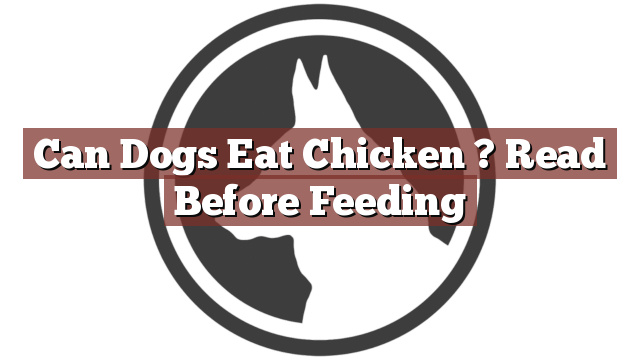Understanding Your Dog’s Dietary Needs
As a responsible pet owner, it is crucial to understand your dog’s dietary needs to ensure their overall health and well-being. Dogs are primarily carnivorous animals, which means their diets should consist primarily of meat. However, this doesn’t mean that all types of meat are suitable for dogs. It is essential to know which meats are safe and beneficial for your furry friend. In this article, we will focus on the question, "Can dogs eat chicken?"
Can Dogs Eat Chicken? Read Before Feeding
Now, let’s address the question at hand. Can dogs eat chicken? The answer is a resounding yes. Chicken is a safe and nutritious protein source for dogs, and many commercial dog foods already contain chicken as one of their primary ingredients. In fact, chicken is a common ingredient found in high-quality dog foods due to its rich nutritional value. It is packed with essential nutrients like protein, vitamins, and minerals, which are essential for your dog’s overall development.
Pros and Cons of Feeding Chicken to Dogs
Feeding your dog chicken has several benefits. Firstly, it provides a high-quality source of protein, which helps build and repair tissues, maintain a healthy coat, and support a strong immune system. Additionally, chicken is relatively low in fat compared to other meats, making it a suitable option for dogs that need to maintain a healthy weight or those prone to pancreatitis. It is also a great source of vitamins such as B6 and B12, which aid in metabolism and red blood cell production.
However, it is important to note that while chicken is generally safe for dogs to consume, there are a few precautions to keep in mind. Firstly, you should always remove the skin and bones before feeding chicken to your dog. The skin is high in fat and can cause digestive issues or pancreatitis, while bones can splinter and pose a choking hazard. Additionally, some dogs may have allergies or sensitivities to chicken, so it is important to monitor your dog for any adverse reactions after introducing it to their diet.
Conclusion: Make Informed Choices for Your Dog’s Nutrition
In conclusion, dogs can eat chicken and benefit greatly from its nutritional value. However, it is crucial to take certain precautions, such as removing the skin and bones, and monitoring for any allergic reactions. If you have any concerns or questions regarding your dog’s diet, it is always best to consult with your veterinarian. Remember, making informed choices about your dog’s nutrition is vital for their overall health and happiness.
Thank you for taking the time to read through our exploration of [page_title]. As every dog lover knows, our furry friends have unique dietary needs and responses, often varying from one canine to another. This is why it's paramount to approach any changes in their diet with caution and knowledge.
Before introducing any new treats or making alterations to your dog's diet based on our insights, it's crucial to consult with a veterinarian about [page_title]. Their expertise ensures that the choices you make are well-suited to your particular pet's health and well-being.
Even seemingly harmless foods can sometimes lead to allergic reactions or digestive issues, which is why monitoring your dog after introducing any new food item is essential.
The content provided here on [page_title] is crafted with care, thorough research, and a genuine love for dogs. Nevertheless, it serves as a general guideline and should not be considered a substitute for professional veterinary advice.
Always prioritize the expert insights of your veterinarian, and remember that the health and happiness of your furry companion come first.
May your journey with your pet continue to be filled with joy, love, and safe culinary adventures. Happy reading, and even happier snacking for your canine friend!

